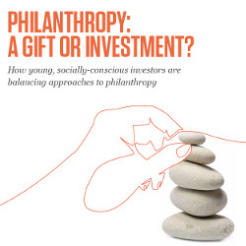A new study of the philanthropic activity of wealthy UK donors has provided clear evidence that those aged under 40 are significantly more likely to participate in socially-conscious investment than their older peers.
The Charities Aid Foundation survey, which gathered information in September 2013 from 1,005 people with an average wealth level of £7.5m, found that nearly two-thirds of all respondents appeared to be active, social-conscious investors.
However, that figure rose to 79 per cent among those under 40 – who comprised 285 of the respondents.
The report, Philanthropy: A gift or investment?, aimed to “get a snapshot of the mentality and activity of those with sufficient disposable income to make strategic decisions about how they deploy their philanthropic capital”.
All the respondents were active donors with average lifetime donations to date of more than £140,000.
The report said that younger donors are showing a growing interest in putting together a portfolio of philanthropic investments, just as they would a portfolio of for-profit investments.
“Four out of five wealthy donors under 40 hold socially-conscious investments – defined as either ethically screened investments or those intended to create a social return (and not necessarily a financial one)," it said.
“The next-largest group pf socially-active investors were those in the age range 40 to 49, among whom 62 per cent had actively made socially-conscious investments.
“Indeed, with a 22 percentage point difference between the under-40s and over-40s when it comes to active social investment, this was clearly no blip.”
More generous donors too
The general giving patterns of this age group also demonstrated their heightened social conscience – on average they had already donated £170,800 to charities, a similar amount to the lifetime giving amounts cited by the over-60s.
The study also found that the younger cohort were more likely to have invested more of their general assets in “social” investment vehicles than their older counterparts – 35 per cent of under-40s’ portfolios were committed to social strategies, compared with 23 per cent of the assets of over-40s.
Barriers to increased social investment
The researchers also questioned respondents about what prevents them from engaging further with social investment. They found: “A large majority of investors, or all age brackets, reported concerns with the complexity of products available, lack of a proven track record, risk, a lack of understanding and, crucially, a lack of specialist advice.”
The report concluded: “The under-40s cohort are spearheading the growth of interest in social investment.
“Philanthropy is not dying. Quite the reverse. As social investments demonstrate, it is evolving to produce a sophisticated and powerful choice of funding solutions with potentially broader and more sustainable impact.”









